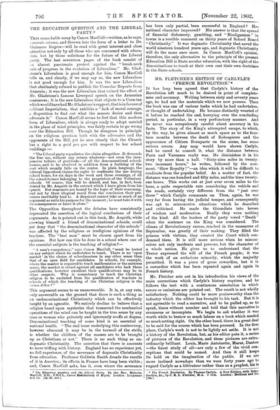THE EDUCATION QUESTION AND THE LIBERAL PARTY.* THIS remarkable essay
by Canon MacColl—written, as he says, rurrente calamo, and thrown into the form of a letter to Dr.
Guinness Rogers—will be read with great interest and close attention not only by all those who are concerned with educa- tion, but by those solicitous for the future of the Liberal party. The last seventeen pages of the book consist of im almost passionate protest against the " break-neck rate of progress in the evolution of Liberalism." Mr. Glad- stone's Liberalism is good enough for him, Canon MacColl tells us, and clearly, if we may say so, the new Liberalism is not good enough for him. It was the new Liberalism that obstinately refused to publish the Consular Reports from Armenia ; it was the new Liberalism that ruined the effect of Mr. Gladstone's famous Liverpool speech on the Armenian massacres; it is the new Liberalism that objects to a Corn-tax which would have had Mr. Gladstone's support, that is in favour of
militant Imperialism, that exhibits a " lack of moral courage, a disposition to find out what the masses desire and then advocate it." Canon MacColl seems to feel that this modern
form of Liberalism, which is always ready to adopt untried in the place of tried principles, was fairly certain to go wrong over the Education Bill. Though he disagrees in principle on the religious question both with the advocates and the opponents of the Bill, yet he sees clearly that the Church has a right to a quid pro quo with respect to her school
buildings:— "The Liberal party repudiates the claim altogether. It demands the free use, without any return whatever—not even the inex- pensive tribute of gratitude—of all the denominational school- houses, and to be absolved in addition from a farthing of the cost which usually falls on the renter. In plain language, the Liberal Opposition claims the right to confiscate the use during school hours, for six days in the week and three evenings, of all the school-houses belonging to the proprietors of the Voluntary schools. Of course, this will be denied, and has, in fact, been denied by Mr. Asquith in the extract which I have given from his speech. But reasoners are bound by the logic of their reasoning, and not by their illogical recoil from the conclusion their pre- misses inevitably lead to. A disputant cannot take as much of an argument as suits his purpose for the moment; he must take it with its consequences or leave it alone."
The Opposition throughout the debates have consistently deprecated the assertion of the logical conclusions of their
arguments. As is pointed out in this book, Mr. Asquith, while avowing himself a friend of denominational schools, could yet deny that " the denominational character of the schools " was affected by the religious or irreligious opinions of the teachers. The "best man" must be chosen apart from his opinions. But how can this be done in a school where one of the essential subjects is the teaching of religion P-
" A man's competency," says Canon MacColl, "must be tested on any subject which he undertakes to teach. There is no 'open market' in the choice of schoolmasters in any other sense than that of an open field for candidates. In schools, for example, where the master is required to teach mathematics or the mistress music, the market is closed against all candidates who lack these qualifications, however excellent their qualifications may be in other respects. Why is competency to teach the Christian religion to be excluded from the qualification of teachers in schools of which the teaching of the Christian religion is the raison d'gtre ?"
This argument seems to us unanswerable. It is, at any rate, only answerable on the ground that there is such a thing as undenominational Christianity which can be effectively taught by an agnostic. We entirely decline to believe that a religion based upon mysteries that transcend the mechanical operations of the mind can be taught in the true sense by any man or woman who privately and ignorantly scoffs at dogma. Denominational teaching of some kind is an essential of national health. " The real issue underlying this controversy, however obscured it may be in the turmoil of the strife, is whether the children of the masses are to be brought up as Christians or not." There is no such thing as un- dogmatic Christianity. The assertion that there is amounts to mere trifling with history. England has no experience yet, no full experience, of the severance of dogmatic Christianity from education. Professor Goldwin Smith dreads the results of it in America; its effects in France have long been visible ; and, Canon MacColl asks, has it, even where the severance
• The Rducation Question and the 'Allred Party. By the Bev. Retool= MacColl, F.R.S.L, Canon Residentlary of Ripon. London : Longmans and Co. fils. Bd. net.1
has been only partial, been successful in England ? Has national character improved P His answer is that the spread of financial dishonesty, gambling, and " Hooliganism " in towns is a terrible comment on thirty years of School Board " Christianity." It was dogmatic Christianity that saved the world nineteen hundred years ago, and dogmatic Christianity will do the same once more. In Canon MacColl's opinion, therefore, the only alternative to the principle of the present Education Bill is State secular education, with the right of the denominations to teach at their own cost their own doctrines in the State schools.










































 Previous page
Previous page